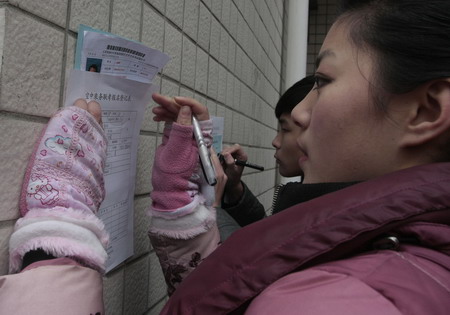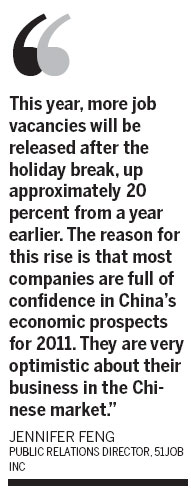Economy
Time of year to quit
By Yang Ning (China Daily)
Updated: 2011-02-21 11:10
 |
Large Medium Small |
Young people fill in job application forms outside a talent market in Beijing. Nearly 70 percent of employees intend to change their employment after the Spring Festival holiday break, according to a recent survey conducted by online human resources service provider 51job Inc. [Photo / China Daily]
Changing jobs reaches a peak in the period following the Spring Festival

BEIJING - Bosses beware. It's that time of year when resignation letters start pouring in.
"New year, new job" is the motto of many as they recover from the excesses of the Spring Festival.
Nearly 70 percent of employees intend to change their employment after the holiday break, according to a recent survey conducted by online human resources service provider 51job Inc.
The survey found that those who worked for overseas companies made up 50 percent of those eyeing new pastures, while employees in Chinese private companies and State-owned businesses made up 40 percent and 10 percent respectively.
 Li Dan, 25, who has worked in a privately-owned construction and engineering company in Beijing for two years, said she submitted her resignation letter on the first working day after the holiday.
Li Dan, 25, who has worked in a privately-owned construction and engineering company in Beijing for two years, said she submitted her resignation letter on the first working day after the holiday.
The reason she quit is that the pay was not good enough. Her company had not given a raise to employees for more than two years.
"This time, I prefer State-owned companies for their better welfare arrangements and stable payments," said Li.
"I expect a 30 percent rise in salary after switching to a new company," she added.
At present, job seekers are obliged to pay more attention to salaries rather than long-term career development paths as they face surging inflation.
China's consumer price index (CPI), the major gauge of inflation, rose 4.9 percent in January from a year earlier, according to figures released by the National Bureau of Statistics on Feb 15.
The figure is 0.3 percentage points higher than that of December, and is 0.2 percentage points lower than the 28-month high in November.
Although average salaries are expected to rise 8.4 percent this year, up 0.5 percentage points from 2010, pay rises may still fail to keep up with the country's price hikes, said another 51job report.
"In my view, the rate of China's average salary rise should surpass, or at least equal the country's GDP (gross domestic product) growth rate," said Liu Jianhui, an analyst with the State Council's Development and Research Center.
Human resource experts predicted that job-hopping would peak in the weeks following the Spring Festival as employees sought better opportunities after getting their annual bonuses.
A year-end bonus is a reward for the previous year of hard work, and few employees would relinquish it by quitting early.
A survey by Zhaopin.com, one of the country's largest online job agencies, showed 21.7 percent of employees wanted to quit jobs right after receiving their yearly bonuses, while another 26.1 percent of respondents intended to find new jobs because the bonuses were lower than expected.
| ||||
"We know that the peak for job-hopping will appear after the payment of the annual bonus, so we decided to postpone the payment to late March," said Bian Yuan, human resources manager of a Taiwan-based high-tech company in Beijing.
"Some companies, especially those in sales, even pay the yearly bonus as late as May to prevent the collapse of the sales team," he said.
Jennifer Feng, public relations director and chief human resources expert at 51job Inc, told China Daily that there are usually more opportunities after Spring Festival and this is particular true this year.
She said job opportunities are abundant during the period after the festival because the majority of companies have completed their recruitment plans for the year and published any vacancies.
"This year, more job vacancies will be released after the holiday break, up approximately 20 percent from a year earlier," Feng said.
"The reason for this rise is that most companies are full of confidence in China's economic prospects for 2011. They are very optimistic about their business in the Chinese market," she added.
| 分享按钮 |



